

Tao Te Ching
Search Sages
Enter all or part of an sage's name or biography in the fields below, then press tab or enter to filter the list of Authors. Click the headings Name or Biography to sort by that column. Diacritics are ignored when searching.
Click on the author's name to go to their page.
| Author Name | Biography |
|---|---|
| Sakya Pandita | 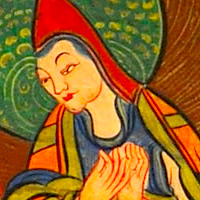 Sakya Pandita Sakya PanditaTibetan spiritual leader, scholar, doctor, scientist, poet, and politician; Sakya Pandita spent his early life as a monastic scholar and his late life applying his experience and understanding to the secular world as an advisor to the Mongol court. Born into a noble family; he began his religious studies at only 5 years old, became a monk at a very early age, and studied in Kashmir, India, and Nepal bringing an international view to his teachings. After Genghis Khan conquered Tibet in 1206, his descendants – drawn by the shamanistic similarities between the Sakya and Mongol traditions – brought Sakya Pandita into the government in an attempt to legitimize Mongol rule. At court he cured the Prince of a serious illness, was given authority over much of Tibet, and became the main agent of the Mongols in Tibetan affairs. He prevented more devastating invasions of Tibet, established an almost 100-year secular Sakya rule, and wrote some of the most influential Tibetan works of literature, many that are still part of the educational curricula today in Tibet, India, and Bhutan. |
| Strom (James) Thurman | 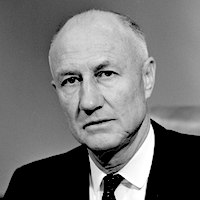 Strom (James) Thurman Strom (James) ThurmanWhite Supremacist Hero Thurman dedicated most of his 48 years as a South Carolina senator fighting against civil rights and racial equality. In 1946 after South Carolina police blinded Black World War II veteran, Isaac Woodard, President Truman proposed legislation to desegregate federal contracting but Thurman led the Southern Racist attempt to stop this by forming the “Dixiecrat” party dedicated to racial segregation. Before the first civil rights legislations was signed into law by Dwight Eisenhower (The Civil Rights Act of 1957), Thurmond inflicted the longest filibuster by a senator on the the senate floor by speaking 24 hours and 18 minutes. He voted against the 1964 Civil Rights Act, the 1965 Voting Rights Act; and, when Goldwater ran for president, Thurman switched parties becoming Republican and leading the five Deep South states to do the same. In 1968, Richard Nixon made a deal with Thurman promising to not let the federal government enforce Black rights in exchange for Thurman political help which he enthusiastically gave. Hypocritically, Thurman—after secretly having a daughter (Carrie "Tunch" Butler) with a 15-year-old Black girl—continued his career focusing on cementing white supremacist policies into the fundamentalist Republican strategy. Infamous for regular acts of sexual harassment, he went a little too far when in 1994 at age 91 he attempted fondling the breast of fellow Senator Patty Murray who he hadn't recognized. |
| James Clavell | 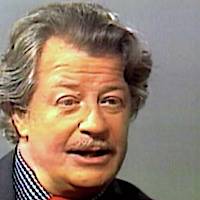 James Clavell James Clavell Fictionalizing and fictional historian Thought of as mainly a novelist but at heart an historian with a story-tellers flare for the dramatic, Clavell romanticized history and made it entertaining. Commentators describe Plato as more of a fictional, literature author than an historian; and, in a similar way, Clavell could be deemed more of a historian than a fiction writer. He appears in his novels as Peter Marlowe, a prisoner of war in King Rat, a novelist in Noble House, and a friend in Whirlwind. The non-fictional foundations of his books describe Japanese prison camp life in King Rat, William Adams—the first of a tiny number of Westerns to become a samurai—in Shogun, Jardine Matheson—founding father of one of the first Hong Kong trading companies and now one of the world’s largest companies, and in Whirlwind, the 1979 Iranian revolution in Iran. Also a filmmaker, his credits include The Fly in 1958, To Sir with Love and The Great Escape in the 1960’s, and many popular TV miniseries based on his books. |
| Bob Dylan |  Bob Dylan Bob DylanThough thought of in many different ways by different people, at heart, Bob Dylan may most essentially represent a modern-day Taoist sage, a continuation of Lao Tzu’s lineage. Awarded the Nobel Prize for Literature in 2016 and called the “Shakespeare of his generation,” he wrote over 500 songs recorded by more than 2000 singers and sold tens of millions of albums. Though world famous for decades and beyond “successful” in numerous ways, his humility and refusal to make a big deal out of himself remains. His music and message transcends his voice and culture. As relevant today as it was in the 60’s, it continues as a major influence on our cultural conscience and consciousness. And this influence shows all signs of continuing far into the future. |
| Virupa | 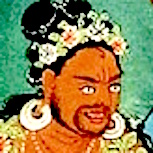 Virupa VirupaMahasiddha #3 Though the hero of many miraculous stories of walking on water, making the sun in the sky stop moving, subjugating demons and over-coming Hindu gods; the main symbolism of Virupa’s life revolved around understanding the sense and not just the words, of following a path of moment-to-moment awareness rather than an external set of values, ethics, and discipline. Revered in the Sakya lineage of Tibetan Buddhism as the first lama in the “Journey without Goal School,” he was kicked out of a monastery after living and practicing there for more than 25 because of eating meat and drinking alcohol. The monks soon recognized their mistake and begged him to return but he refused and continued his aimless wondering exemplifying Lao Tzu’s description of wu wei. |
| René Descartes | 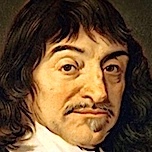 René Descartes René DescartesThough remaining a Catholic, solidifying the dualistic view in Western thought as well as “Cogito ergo sum” belief in a separate self; Descartes emphasized methodic doubt and the impossibility of externally based intellectual certainty undermining faith in belief and Church doctrine. This sparked a thought revolution that created the modern era. He developed analytic geometry (using x, y, and z for unknowns) and using superscripts for powers or exponents, discovered the law of reflection, and the basis for the development of calculus. Known as the “father of modern philosophy,” he changed the course of Western philosophy and his influence continues to this day. |
| Emily Dickinson | 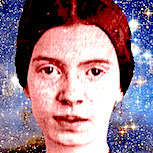 Emily Dickinson Emily DickinsonThough now considered one of the greatest figures in American literature and one of the most important poets, only a few of Dickson’s poems were published during her lifetime and those were significantly edited and changed by publishers. Her first collection wasn’t printed until years after her death and a complete collection wasn’t published until 1955. A serious student of botany, she made and maintained a vast collection of plants; highly introverted, creative, unique, and challenging the assumptions of her time; she seldom left her house but wrote 40 volumes of almost 1800 poems. |
| Arthur Schopenhauer |  Arthur Schopenhauer Arthur SchopenhauerThough mainly unnoticed during his life, after he died Schopenhauer’s work had a huge impact on psychology, literature, art, philosophy, music and science. He was one of the first Western thinkers to affirm major aspects of Eastern philosophy. He called himself a Buddhist and compared his philosophy to basic Buddhist teachings. Einstein extolled Schopenhauer’s life-long influence and he was also respected and emulated by people like Nietzsche, Tolstoy, Freud, Jung, Joseph Campbell and Thomas Mann. His influence continues today into fields like modern evolutionary psychology. |
| Chang-shih | 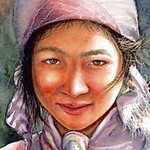 Chang-shih Chang-shihThough little known by history, Mencius’ mother Chang-shih became an exemplar in Chinese culture for good parenting and is immortalized in an idiom know by almost all Chinese speakers. A wise and dedicated single mother, she moved her home 3 times searching for the best educational environment for her son – once because he was being too influence by funeral rites, once because the influence was business, and finally settling near a good school. Her wisdom continued during Mencius’ later life once famously changing his attitude from blaming and planning to divorce his wife to accepting the blame himself. |
| Du Fu 杜甫 | 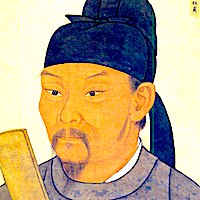 Du Fu 杜甫 Du Fu 杜甫 Though Li Bai in the West is most often considered China's greatest poet, in the East, that honor most often falls to Du Fu, "the Chinese Shakespeare." Historian, sage, and compared to Milton, Burns, and Wordsworth; Du Fu failed the Chinese examinations for public office although the subject was poetry but became one of China's most influential writers. A close friend and traveling companion of Li Bai during a time of intense political change, his fortunes rose and fell from the highest honors to the depths of misery finally to be robbed of the straw in his bed while he was too weak to resist. In Japan considered the "Saint of Poetry" and the major influence on the greatest haiku poet, Matsuo Bashō; Du Fu excelled at reconciling opposites, considered "everything in this world is poetry," and became one of the greatest writers in any language. |
| Elizabeth I | 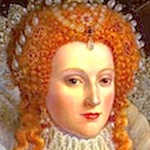 Elizabeth I Elizabeth IThough far from a sage or saint, Elizabeth began her reign with England reviled and powerless but left it 45 years later rich and strong. Called by historians “The greatest ruler England has ever had,” she was patron to Shakespeare, Bacon, Marlowe, and Drake launching the scientific revolution and a golden age of progress and learning. Excommunicated by Pope Pius V, she believed that faith was personal, became “mother of the Church of England.” She opened up trade with the Islamic Ottoman Empire, and helped end the Vatican’s power over all Europe. Though stained by abuses in Ireland, she listened to popular sentiment and advice dedicating her life to her country and people becoming a symbol for good government and resistance to foreign threat. |
| Goethe, Johann Wolfgang von | 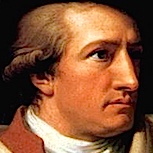 Goethe, Johann Wolfgang von Goethe, Johann Wolfgang von Though a literary celebrity at 25 and most well known for his novels and poems, Goethe was also a natural philosopher, diplomat, civil servant, geologist, and scientist who developed a theory of color, inspired Tesla’s discovery of alternating current and whose early work on evolution influenced Charles Darwin. A freethinker who blended Christianity with pantheism, humanism, and other esoteric traditions, he became a major influence on Hegel, Schopenhauer, Kierkegaard, Nietzsche, Hesse and Jung. He authored some of the greatest novels ever written and his poems were set to music by Mozart, Beethoven, Schubert, Brahms, Liszt and many others. Continuously creating for 82 years, his wisdom deepened and merged into a culture we take for granted today. |
| Richard Nixon | 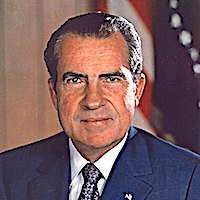 Richard Nixon Richard NixonCorrupt and immoral yet brilliant and accomplished politician Thoroughly corrupt, immoral, and self-serving politician; yet, brilliant and accomplished, Nixon created the EPA, ended the draft and the Viet Nam war, opened diplomatic relations with China, began the Endangered Species Act and the War on Cancer, restarted the Middle East peace process, and initiated the Anti-Ballistic Missile Treaty with the Soviet Union—an impressive list but short compared to his list of scandals, lies, and corruption. |
| Duanmu Ci | 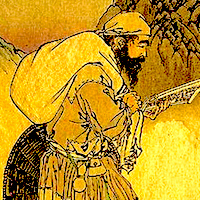 Duanmu Ci Duanmu CiConfucius’ most important disciple Third of the Twelve Confucian Wise Ones, successful and wealthy businessman, diplomat, and most important of Confucius’ disciples; Duanmu Ci became one of the most accomplished Confucian speakers and the one most mention in the Analects. His accomplishments however led to an arrogance that Confucius criticized along with his lack of empathy and harshness. When he claimed achieving the Confucian ideal, the Master dismissed him from his posts. Confucius later gave him the task of saving their state of Lu from the more powerful army of Qi that was preparing to attack and take over. His strategy and diplomacy saved Lu, significantly change the history of 5 states, and much of that time’s Chinese history. His memorial tablet is traditionally placed on the east side of Confucian temples. |
| Helena Roerich | 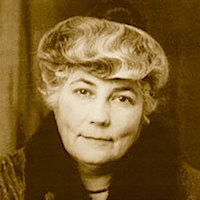 Helena Roerich Helena RoerichTheosophist, translator, archeologist, adventurous traveler to unknown inner and outer realms, founder of the Institute of Himalayan Studies, co-creator of the "Agni Yoga" practice of “Living Ethics”; Helena Roerich with her husband Nicholas fearlessly explored remote regions of Mongolia, Tibet, India, China, and the Altai regions of Russia. During these travels, they discovered rare manuscripts, enclaves of wisdom, and many insights into the cultural unity of diverse people. This led to her writing 20 books including the 1926 "Foundations of Buddhism" that helped spark an early Western interest in Buddhism. She co-authored an international treaty signed by heads of 22 countries that helped protect historical monuments, scientific and artistic institutions. A frequent correspondent with president FDR and VP Henry A. Wallace, she was at first a positive influence but then a political liability that led to Wallace’s defeat by Harry Truman. |
| Friedrich Viktor Strauß | 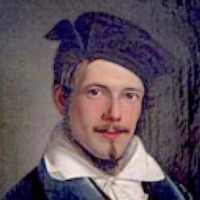 Friedrich Viktor Strauß Friedrich Viktor Strauß First German Tao Te Ching translator Theologian, poet, minister, translator, and scholar; Strauß published the first German Tao Te Ching translation in 1880. He also translated Chinese classic poetry, wrote novellas and gypsy romance. Sill popular today, his Tao Te Ching translation's 11th edition was published in 2004. His translation of the Shijing (Book of Songs) in 1880 became the first German translation. An ambassador and minister, he also translated his insight and understanding of Chinese wisdom into Western culture. Some of his hymns are still sung in churches and for weddings. |
| Richard Wilhelm | 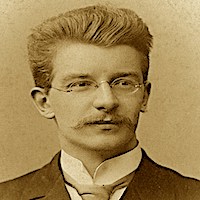 Richard Wilhelm Richard WilhelmTranslator bridging East and West Theologian, missionary, early sinologist, and personal friend of Carl Jung; Wilhelm gave us two culturally transformative translations: the I Ching and The Secret of the Golden Flower. He moved to China as a young man and lived there for 25 years. During that time, he met a sage driven out of his hermitage by the revolution—Lau Nai Suan who introduced him to the philosophy of Chinese yoga and the I Ching's psychology. This meeting and his studies produced a bridge between east and west but also a deep conflict within Wilhelm between consciousness and unconsciousness, between his Christianity and eastern philosophy. |
| Blaise Pascal | 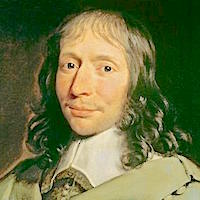 Blaise Pascal Blaise PascalOne of the greatest French writers of all time Theologian, inventor, physicist, philosopher; Pascal invented the mechanical calculator, set up the first bus line moving passengers, became one of the greatest French writers, and developed probability theory which has become critical to economics, actuarial science, and the way we understand decision-making and risk. Although he identified with Jansenism which emphasized original sin and human depravity and frequently fixated on religious dogma, his understanding extended to a deep realization of our strong propensity toward projection and self-deception as well as a philosophy of cutting through this kind of deceit and duplicity. His significant scientific contributions led to attaching his name to a programming language, a unit of pressure, and a hydrostatic law. Will Durant called one of his writings, "the most eloquent book in French prose.” |
| Mircea Eliade | 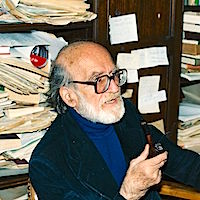 Mircea Eliade Mircea EliadeTheologian of the Sacred, philosopher, professor, historian of religion, journalist who “never read newspapers,” and novel writer; Eliade became one of the most influential interpreters of religious experience. As a very conservative youth, he supported far right ideologies; but, during his later life, this support shifted toward the non-Marxist Left and the hippie youth movement. Although an admirer of Gandhi and non-violence, he was accused of antisemitism and support of fascism. He was identified with far-right politics but fired from a University position because of an attack by the far-right press. His theories and descriptions of religious experience (in particular hierophanies and the “Eternal Return”) established paradigms for religious studies still accepted today. |
| Anna Grigoryevna Dostoyevskaya | 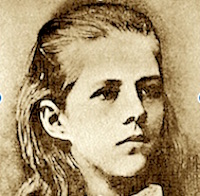 Anna Grigoryevna Dostoyevskaya Anna Grigoryevna DostoyevskayaThe woman behind the man and clear example of “better half,” Dostoyevskaya started helping Dostoyevsky as a 19-year old secretary when he was 44 and soon became not only his devoted and energetic wife; but also, his very capable business partner who helped him through extreme poverty, illness, and gambling addiction that at one point lost not all their money but her clothing as well. Not remembered very well by history but essential to Dostoyevsky’s success, she took charge of all their financial issues, publishing and business affairs, made him Russia’s first self-publish author liberating him from a lifetime of poverty and debt. To disprove one of his disparaging remarks about women, she became one of the first female Russian philatelists and worked on her collection for over 50 years while she wrote two biographies; saved his manuscripts, letters, and photographs; and set up a display of them in a State Historical Museum. |